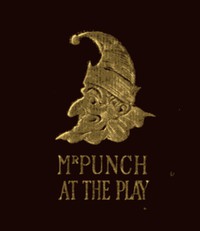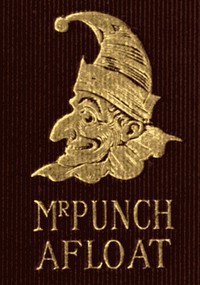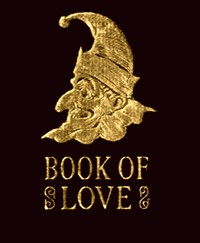Mr. Punch at the Play: Humours of Music and the Drama by Hammerton and Keene (have you read this book TXT) 📗

- Author: Hammerton and Keene
Book online «Mr. Punch at the Play: Humours of Music and the Drama by Hammerton and Keene (have you read this book TXT) 📗». Author Hammerton and Keene
Ralph (irritably). The play isn't written yet. (Plaintively.) Do go![Pg 140]
Mrs. E. (sweetly). I'm sure you'd like to be alone. Don't keep dinner waiting.
[Beams on him affectionately and exits. Ralph gives a sigh of relief, rumples his hair, and then writes for a few minutes. Then pauses, leans back, biting his pencil, when the door is flung open, and a very good imitation of a whirlwind bursts into the room. The whirlwind is a robust person of forty, he has a large round red face fringed with sandy whiskers, and is one mass of health and happiness. He wears Norfolk jacket, knickerbockers, gaiters and thick boots, and carries a golfing bag. He slaps Ralph heartily on the back, and laughs boisterously. Ralph collapses.
Tom (heartily). How are you? Going strong—what? Asked the wife for you, and she told me you were in here writing a play. Rippin' idea—what?
Ralph (worried, but striving to be pleasant and polite). What do you want, old chap?
Tom (cheerfully). Nothin' particular, only just to see how you were gettin' on—what? Do you good to have half an hour out, just a few holes—golf—what?[Pg 142]
Ralph (with great self-restraint). Thanks, old man. Not now. You don't mind my asking you to leave me to myself a bit?
Tom (amiably rising and picking up his bag). All right, old chap, you know best—what? Thought I'd just look in—hey?—what? Well, I'm off. (Goes to door, thinks for a moment, and then turns round.) I say, I know Thingummy's acting manager. If I can put in a word about your play—hey?—what?
Ralph (rises hurriedly. Shakes hands with Tom, and skilfully manœuvres him into the passage, then calls after him). Good-bye, old man, and many thanks. (Closes the door and returns to his desk, grinding his teeth.) Confound him! (Takes up paper and writes a few lines, then reads aloud.) "Puffington puts the letter in his pocket and passes his hand through his hair. He groans 'O, why did I ever write those letters? I know Flossie, and this means fifty pounds at least, and if ever my mother-in-law gets to hear of it! O lor, here she is'" (Puts down the paper and looks up at the ceiling.) Now, speaking to myself as one man to another, I can't help thinking that this sort of thing has been done before. I seem to have[Pg 144] heard it somewhere. I'll—I'll—try a fresh start. (Writes hurriedly for a few minutes and then reads.) "Scene.—Fashionable watering place, the beach is crowded; on the pier the band is playing a dreamy waltz. Edwin and Maud are discovered in an open boat. Edwin. You must be tired of rowing, sweetest; come and steer. Maud. Just as you like, darling. (As they change seats the boat capsizes. After clinging for twenty minutes to the upturned keel, they are rescued by a passing steamer.)" That's all right for a "situation," but there seems a lack of dialogue. They can't very well talk while they are clinging to the boat; and what the deuce could they be talking about before? If I let them drown I shall have to introduce fresh characters. Bother! (Meditates with frowning brow.) Playwriting appears to present more difficulties than I thought. (Takes up a newspaper.) "May bring in anything from five to twenty thousand pounds!" Sounds tempting, but I wonder how it's done?
[Takes a cigar from the mantelpiece, lights it, and, seating himself near the fire, smokes thoughtfully. Gradually his head sinks back on to the top of the chair, the cigar drops from his relaxed fingers, and as he sleeps, the shadow of a smile breaks across his face. An hour elapses; he is still sleeping. Enter Mrs. Essendean, who brushes against the writing-table and sweeps the sheets of manuscript to the ground.
Mrs. Essendean (crossing to Ralph and lightly shaking him). My dear, my dear, not dressed yet! Do you know the time—just the half-hour.
(Ralph starts up.) Eh? (Looks at the clock.) Nearly half past, by Jove! I shan't be two seconds.
[Rushes hastily from the room.
Mrs. Essendean (picks up the extinguished cigar, and drops it daintily into the fire. Looks round the[Pg 149] room and sees the littering manuscript.) What an untidy old thing it is! (Picks up the sheets, crumples them into a ball and throws them into the waste-paper basket.) There, that looks better.
[Gazes into the mirror, pats her hair, and exit.
(End of the play.)[Pg 137]
Ethel. "It was a most wonderful performance, Aunt Tabitha! First, she was shot out of a cannon's mouth on to a trapeze fifteen yards above the orchestra, and then she swung herself up till she stood on a rope on one leg at least a hundred and twenty feet above our heads!" Aunt Tabitha. "Ah! I always think a woman lowers herself when she does that!"
[Pg 139]
First Masher. "Let's stop and look at Punch and Judy, old chappie! I've heard it's as good as a play."
Second Masher. "I dessay it is, my brave boy. But we ain't dressed, you know!"
[Pg 141]
Scene: Mr. Foote Lyter's back Drawing-room. Private Theatricals. Dress Rehearsal.
Mr. Foote Lyter. "I say, Drawle, while the Duke is having his scene with Dora, where am I to stand!" Captain Drawle (amateur stage manager). "Well—er—my dear fellow—er—er—it's your own house, you know—you can stand where you like!"
[Pg 143]
Exasperated Old Gentleman (to lady in front of him). "Excuse me, madam, but my seat has cost me ten shillings, and I want to see. Your hat——" The Lady. "My hat has cost me ten guineas, sir, and I want it to be seen!"
[Pg 145]
Tomkins, who has recently made his appearance en amateur as the Melancholy Dane, goes to have his photograph taken "in character." Unfortunately, on reaching the corner of the street, he finds the road is up, and he has to walk to the door! Tableau!!
[Pg 146]
Clever Juvenile (loq.). "Shakspeare? Pooh! For my part I consider Shakspeare a very much over-rated man."
[Pg 147]
Astonished Friend. "Why!—Why! What on earth are these?"
Manager. "These? Oh! These are fairies!!"
[Pg 148]
Fitted with binocular glasses for the benefit of those sitting behind its wearer.
Wag (to unfortunate small gent, who has vainly endeavoured to persuade lady to remove her hat). "Don't you see she's got a bird in her hat, sitting? You wouldn't have the lady addle-headed, would you?"
[Pg 150]
Suburban Roscius. "Ah, I saw you were at our 'theatricals' the other night. How did you like my assumption of Hamlet?" Candid Friend. "My dear f'llar—great'st piece of assumption I ever saw i' m' life!"
[Pg 151]
Eminent Provincial Tragedian. "Come hithorr, sweet one! Your mothorr tells me that you shed teorrs during my soliloquy in exile, last night!"
Sweet One. "Yes, sir. Mother kept on pinching me, 'cause I was so sleepy!"
[Pg 152]
Our Philanthropist (who often takes the shilling gallery—to his neighbour). "Only a middling house."
Unwashed Artisan. "Ay—that sixpence extry, 'rather heavy for the likes o' huz, y'know. But there's one thing—it keeps out the riff-raff!!"
[Pg 153]
�sthetic Critic (at the club, after the theatre). "Can you imagine anything more utterly solemn than the d�no�ment in Romeo and Juliet? Two lovers, both dying in the same vault! What fate more weirdly tragic could——"
Cynical Old Bachelor (who has evidently never read the play). "Um—'s no knowing. The author might 'a' married 'em!"
[Pg 154]
Distinguished Amateur (about to make his first appearance in public at a concert for the people). "Oh, I do feel so nervous!" Sympathetic Friend. "Oh, there's no occasion to be nervous, my dear fellow. They applaud anything!"
[Pg 155]
Mamma (to Maud, who has been with her brother to the play, and is full of it). "But was there no love in the piece, then?" Maud. "Love? Oh dear no, mamma. The principal characters were husband and wife, you know!"
[Pg 156]
Jones (who understands French so well, although he does not speak it), reading over list of pieces to be played at the Gaiety:—"'Le Gendre de M. Poirier.' Why, what gender should the man be, I should like to know!"
[Pg 157]
The Bishop. "I hope your grandchildren liked the circus, Lady Godiva. That was a wonderful performance of Mlle. Petitpas on the bare-backed steed, wasn't it?"
Lady Godiva. "Yes—a—but I dislike those bare-backed performances. They're so risky, you know!"
[Pg 158]
[Pg 159]
"Ha! Mistare Robinson! 'Ow do you do? 'Av you seen ze last new piece at ze 'Olleborne? Supairrb! Splendeed!! Good!!!"
"A—no—I don't patronise the English drama. I like finish, delicacy, refinement; and I'm happy to say I've secured tickets for all the French plays!"
"Tiens! Mais vous savez le Fran�ais, alors?"
"A—I beg your pardon?"
"Je vous demande si vous savez le Fran�ais, parbleu! Cruche, Melon, Baudet, Dinde, Jobard, Cr�tin, Momie, Colin-Maillard que vous �tes?"
"A—quite so! No doubt! A—by the bye, have you seen Jones lately?"
[Pg 160]
BETWEEN THE ACTS; OR, THE DRAMA IN LIQUORScene—Refreshment Saloon at a London Theatre. A three-play bill forms the evening's entertainment. First Act over. Enter Brown, Jones, and Robinson.
Brown. Well, really a very pleasant little piece. Quite amusing. Yes; I think I will have a cup of coffee or a glass of lemonade. Too soon after dinner for anything stronger.
Jones. Yes, and really, after laughing so much, one gets a thirst for what they call light refreshments. I will have some ginger-beer.
Robinson. Well, I think I will stick to iced-water. You know the Americans are very fond of that. They always take it at meal-times, and really after that capital �quivoque one feels quite satisfied. (They are served by the bar attendant.) That was really very funny, where he hides behind the door when she is not looking.
[Laughs at the recollection.
[Pg 162]
Brown. And when the uncle sits down upon the band-box and crushes the canary-cage!
[Chuckles.
Jones. Most clever. But there goes the bell, and the curtain will be up directly. Rather clever, I am told. The Rose of Rouen—it is founded on the life of Joan of Arc. I am rather fond of these historical studies.
Brown. So am I. They are very interesting.
Robinson. Do you think so? Well, so far as I am concerned, I prefer melodrama. Judging from the title, The Gory Hand should be uncommonly good.
[Exeunt into Theatre. After a pause they return to the Refreshment Room.
Brown. Well, it is very clever; but I confess it beats me. (To bar attendant.) We will all take soda-water. No, thanks, quite neat, and for these gentlemen too.
Jones. Well, I call it a most excellent psychological study. However, wants a clear head to understand it. (Sips his soda-water.) I don't see how she can take the flag from the Bishop, and yet want to marry the Englishman.
Robinson. Ah, but that was before the vision.[Pg 164] If you think it over carefully, you will see it was natural enough. Of





Comments (0)